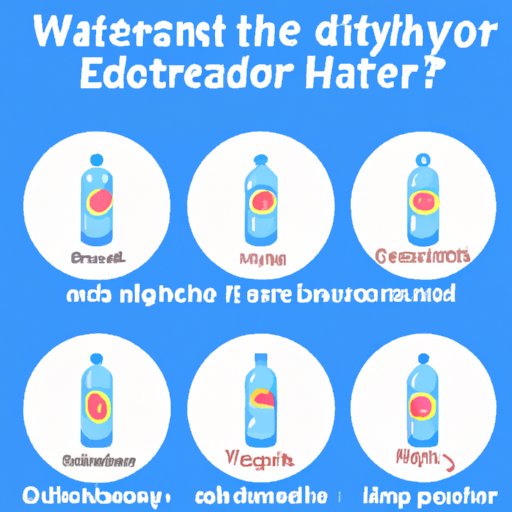
Introduction
Have you ever wondered if you’re drinking enough water? Maintaining proper hydration is crucial for our overall health and well-being. Dehydration, a condition in which the body loses more fluids than it takes in, can cause a range of symptoms and even lead to serious health problems.
In this article, we will discuss the symptoms of dehydration, the benefits of staying hydrated, and tips on how to prevent and treat dehydration. Additionally, we will explore hydration myths and how to incorporate more fluids into your daily routine.
Symptoms of Dehydration: How to Recognize Them and Protect Your Health
Dehydration can occur for many reasons, including excessive sweating, fever, vomiting, diarrhea, and not drinking enough fluids. The following are common symptoms of dehydration:
– Thirst
– Dry or sticky mouth
– Dark yellow or amber-colored urine
– Fatigue or weakness
– Dizziness or lightheadedness
– Headache
– Dry skin
– Muscle cramps
– Irritability or confusion
Each symptom has a specific cause and indicates that the body lacks sufficient fluids. For instance, thirst is the body’s way of signaling that it needs more water. Dry mouth occurs when the production of saliva decreases, while dark yellow urine means that the kidneys are conserving water and releasing concentrated urine.
To prevent dehydration, it’s essential to drink plenty of fluids and avoid alcoholic and caffeinated beverages, which can dehydrate the body. Consuming hydrating foods such as watermelon, cucumbers, and celery can also help replenish fluids.
Water Intake Tracker: Why It’s Important and How to Keep One
Tracking water intake is an effective way to monitor hydration levels and ensure that you’re drinking enough fluids. There are many ways to create a water intake tracker, depending on your preference and lifestyle.
One way is to use a mobile app or a fitness tracker, which allows you to log your water consumption and receive reminders to drink more water. Another option is to keep a water journal, where you can record the amount of fluids you consume each day.
Setting goals and measuring progress can help you stay motivated and make adjustments based on your hydration needs. For instance, you can aim to drink half of your body weight in ounces of water per day or increase your water intake after exercise or exposure to high temperatures.
The Role of Electrolytes in Hydration: What You Need to Know
Electrolytes are minerals that play a crucial role in maintaining hydration and fluid balance in the body. Common electrolytes include sodium, potassium, magnesium, and calcium.
Sports drinks, coconut water, and electrolyte supplements are excellent sources of electrolytes and can replenish lost fluids after exercise or other activities that cause dehydration. Foods like bananas, avocado, dark leafy greens, and nuts can also increase electrolyte intake.
It’s important to note that excessive intake of electrolytes, especially sodium, can be harmful to health. Therefore, it’s essential to follow recommended guidelines and seek advice from a healthcare provider if you have any underlying medical conditions.
Hydration Myths or Facts?
There are many myths surrounding hydration, and it’s essential to separate fact from fiction. Here are some of the most common hydration myths and the truth behind them:
– Myth: You need to drink eight glasses of water a day.
– Fact: The amount of water you need depends on your body weight, activity level, and climate. The Institute of Medicine recommends a daily water intake of 91 ounces for women and 125 ounces for men, including fluids from food and other beverages.
–
– Myth: Urine color indicates hydration level.
– Fact: While dark yellow urine can signify dehydration, it’s not the only factor to consider. Other factors such as medications, vitamins, and medical conditions can affect urine color. The best way to check your hydration level is to observe your body’s symptoms and drink plenty of fluids.
How to Stay Hydrated During the Day
Incorporating more fluids into your daily routine can be fun and enjoyable. Here are some practical tips to stay hydrated:
– Carry a water bottle with you and sip throughout the day.
– Set reminders on your phone or computer to drink more water.
– Include hydrating foods like soups, smoothies, and juicy fruits in your diet.
– Try flavored waters, herbal teas, or infused water for a change of taste.
– Avoid sugary or alcoholic drinks that can dehydrate your body.
Conclusion
In conclusion, hydration is crucial for our health and well-being. Dehydration can cause a range of symptoms and lead to serious health problems, so it’s essential to recognize the signs and take measures to prevent and treat dehydration.
By tracking water intake, understanding the role of electrolytes, and staying hydrated during the day, you can maintain proper hydration levels and improve your overall health.
Remember to check with your healthcare provider if you have any underlying medical conditions that may require additional attention. Stay hydrated and enjoy the benefits of a healthy, happy body.





